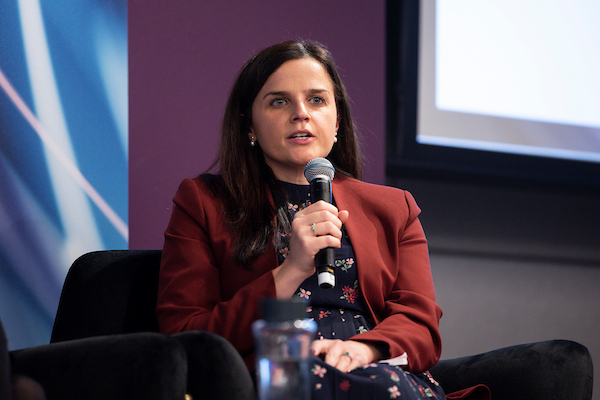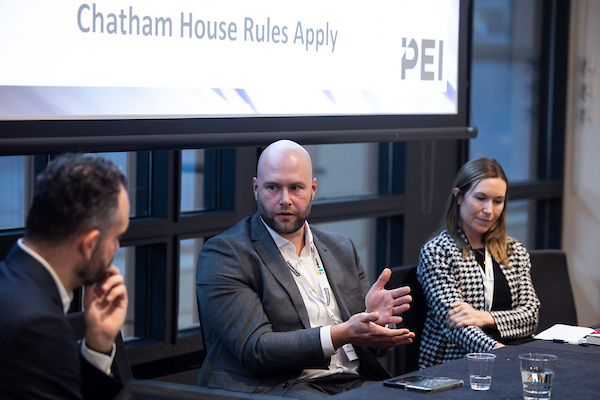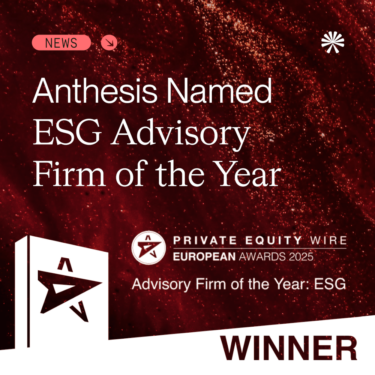
Table of Contents
- Driving Value Creation Through ESG
- Decarbonisation's Impact on Valuation
- ESG Vendor Due Diligence
- Broadening Engagement
- Regulator Drivers
- Empowering Portfolio Companies
- Concluding Thoughts
- Contact Us
Share this article
Last week, Private Equity International hosted its 15th Responsible Investment Forum Europe in London, bringing together institutional investors, fund managers and ESG professionals to discuss the latest advancements in sustainable investment. With an agenda rich in critical topics, including Anthesis’ Zara de Belder and Chris Shaw on the growing role of ESG in value creation and the regulatory landscape, the Anthesis team shares learnings from conversations at the two-day event.
RIF Europe 2024 underscored a pivotal shift in the Private Equity (PE) landscape. ESG is becoming a crucial driver of value creation and robust risk management in a world of increasing ESG regulation. This shift is evident across the industry, shaping future sustainable investing strategies and demanding a more proactive and integrated approach.
The conversations highlighted key trends shaping the future of sustainable investing in private markets, moving beyond simple measurement and into a new phase of strategic integration, proactive engagement and action aligned with value creation.
Beyond Measurement: Driving Value Creation Through ESG
The proliferation of ESG data across private markets, driven by initiatives like the ESG Data Convergence Initiative (EDCI), necessitates a more strategic approach to data management and analysis. The focus must shift to critically evaluating how ESG-related actions directly translate into value creation. Several firms are seeing significant financial benefits from proactive ESG strategies, with one firm reporting a substantial increase in EBITDA (3-4%) directly linked to its ESG initiatives. This demonstrates that a proactive, data-driven approach to ESG is crucial for maximising impact and gaining a competitive edge.

Decarbonisation: A Direct Impact on Valuation
The clear and present reality is that decarbonisation costs directly impact a company’s valuation and companies decarbonising later will have higher costs and a greater percentage reduction compared to those starting now. Proactive decarbonisation strategies are no longer optional; they are essential for mitigating risk and maximising value.
A fireside chat on the future of sustainability in private markets underscored this point, stating that decarbonisation discounts on values at exit are simply a matter of time, and our job is to prove it doesn’t reduce returns; it opens returns. Integrating decarbonisation into due diligence and value creation planning reduces operational expenditure (OpEx), lowers cost of capital, and generates revenue.
ESG Vendor Due Diligence: Realising Transformative Value
The rapid increase in ESG vendor due diligence (VDD) is transforming the exit process. VDD reports are becoming powerful tools for sellers to demonstrate ESG alignment, highlight value creation opportunities, and present a compelling case to buyers. This strategic approach enables sellers to realise a premium for strong ESG performance at exit, reassuring buyers with a low-risk, future-proof investment. However, the key is early integration into the investment strategy; waiting until exit is simply too late. Data is crucial to substantiate the impact. There is value in having a good Chief Sustainability Officer (CSO), which is recognised at exit, but panellists emphasised difficulties in finding good CSOs to drive ESG value creation.
Broadening Engagement: A Collaborative Value Creation Approach Across M&A
Conversations at the event highlighted the crucial need for a broader, more collaborative approach to ESG, extending beyond traditional ESG and management teams to actively involve deal teams. Leveraging the inherent competitive drive within these teams can incentivise behaviour change and drive superior ESG outcomes. Simultaneously, PE firms are evolving their ESG functions, actively recruiting specialists in areas like climate and nature, alongside individuals with investment backgrounds. This expansion of expertise is further enhanced through internal task forces, industry working groups, and peer-to-peer engagement, fostering a more collaborative and informed approach to ESG integration throughout the entire investment lifecycle.
Regulatory Drivers to Continue Influence
Another core theme and topic of much debate at RIF was the increasing pressure from regulatory drivers such as the CSRD, CSDDD and ISSB. Many general partners and their portfolio companies are still tackling this challenge. There was a theme of pragmatism and interoperability in the conversation, along with advice to engage early and broadly with internal stakeholders; especially finance and legal. However, there remains uncertainty around what a proportionate approach means for some impending regulations, such as what transition plans mean in practice for companies falling into CSDDD.
Empowering Portfolio Companies: A Shared Responsibility
Engaging portfolio companies through various channels—webinars, case studies, ESG forums, and awards—is crucial. This collaborative approach not only raises awareness and understanding but empowers portfolio companies to actively participate, particularly concerning data collection and regulatory reporting. Despite these efforts, challenges remain, including resourcing constraints and clearly communicating ESG’s relevance across different roles and business functions. The clear articulation of the value creation linkage at the beginning of ownership remains a crucial task.

Concluding Thoughts
The RIF Europe 2024 reinforced the crucial role of ESG in PE to 500 industry leaders. Well-integrated ESG is a strategic imperative that drives value. To succeed, firms must measure, integrate, and quantify ESG action at every stage of the investment lifecycle, fostering collaboration, proactive risk management, and data-driven decision-making. The key takeaways from RIF Europe 2024 underscore the increasing complexity and strategic importance of ESG generating long-term value within the PE sector.
As the industry navigates this evolving ESG landscape, Anthesis is uniquely positioned to support PE firms. From active support through the entire investment lifecycle to decarbonisation due diligence and innovative digital ESG Management and Decarbonisation platforms, Anthesis’ services are designed to help PE firms integrate ESG effectively, manage risk proactively, and ultimately unlock significant value creation opportunities.
Driving ESG integration for private equity
Whether you aim to leverage ESG for competitive advantage or ensure compliance, our sustainable finance experts can guide you in enhancing performance and aligning with best practices.
We are the world’s leading purpose driven, digitally enabled, science-based activator. And always welcome inquiries and partnerships to drive positive change together.





